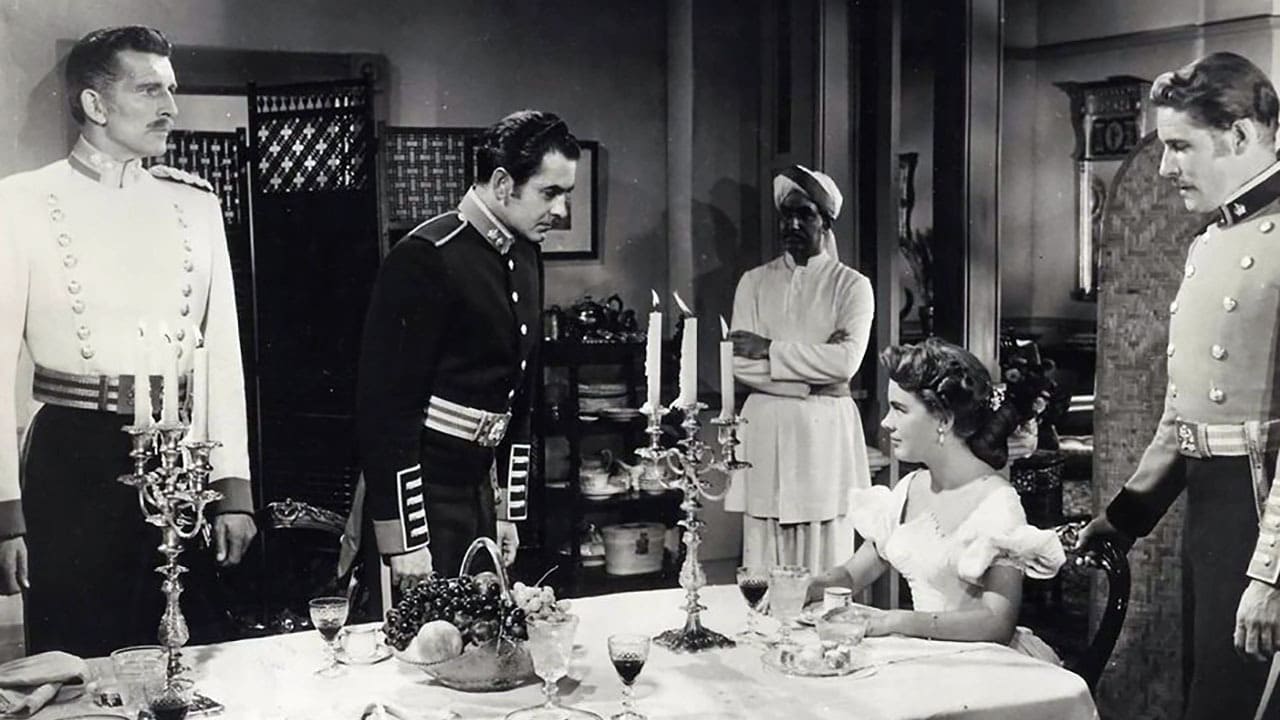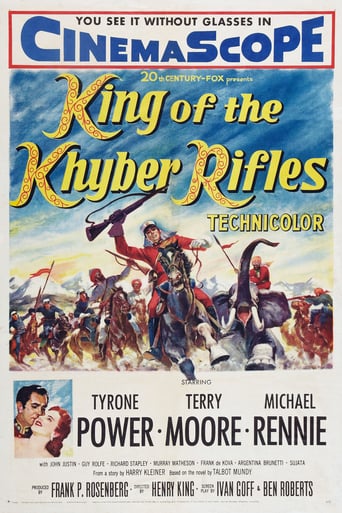

Based on Talbot Mundy's best and most famous novel, which unfortunately I was an expert on, this film was a total disappointment, in spite of its great assets of mainly stupendous mountain scenery and Bernard Herrmann's music. But the mountain scenery was nothing at all about the famous Khyber pass but all shot in California, and above all, the splendid story of Talbot Mundy's secret agent thriller of jihadism and the cutting of heads even 160 years ago by taliban rebels and with a dancing queen of beauty at the centre of intrigue, also involving some archaeology and reminiscenses of Alexander the Great's famous visit to Afghanistan, was reduced to a cheap and petty pulp fiction of the commonest of Hollywood clichés. The acting is not very good either. The only one making a strong impression by his stage presence and acting is Guy Rolfe as the villain, the rebel king, while supporting parts, such as John Justin and Michael Rennie, also make a good job, while Terry Moore is a complete disaster. However could Tyrone Power fall in love with such a nuisance of a bobby-soxer? It's as far from credible as anything could be. Tyrone Power is himself, and that's enough for him - with such a face he never even needed to act.A great pity for a great story to be so poorly handled and reduced to mere superficial entertainment. Talbot Mundy was a theosophist and mystic who wrote many books, and this one could have been made into as great a Kipling epic as "The Man who Wanted to be King".
... View MoreKing of the Kyber Rifles is directed by Henry King and adapted to screenplay by Ivan Goff and Ben Roberts from a story written by Harry Kleiner. It stars Tyrone Power, Terry Moore, Michael Rennie, John Justin and Guy Rolfe. Music is scored by Bernard Herrmann and cinematography by Leon Shamroy.A remake of John Ford's The Black Watch (1929), and loosely based on Talbot Munday's novel of the same name, film finds Power as Captain Alan King, who whilst stationed in India 1857 finds himself looked down upon because of his half caste blood. Things are further stirred when King turns the eye of the General's (Rennie) daughter (Moore). The Garrison needs to sort itself out because Indian rebels are on the war path.One of the early 20th Century Fox productions in Technicolor and CinemaScope, King of the Kyber Rifles, filmed out of Lone Pine in the Alabama Hills, is gorgeous to look at, has top draw high energy action (though there isn't as much as you would like), and the cast turn in performances that are full of stiff upper lip and stout of heart splendour. A handsome production for sure, across the board (Shamroy and Herrmann deliver the goods once again), but story often drags and passages of talk come off as trite, forcing us to hanker for the next wide location shot or perky action sequence. There's a very disjointed feel to the narrative structure, we have to fill in some gaps ourselves, it's almost as if the makers were wondering which way to lean as regards the best selling point. To make an intelligent movie with the odd bit of action filmed in Scope? Or just an out and out Errol Flynn action type movie to stir the blood whilst forgoing any emotional depth?They don't achieve either, and thus we are left with a good looking failure. Shame, Power and King were often a great pairing, and with the tools available on the production, this should have been a cracker. 6/10
... View MoreFox's KING OF THE KHYBER RIFLES (1953) is quite a reasonably good colourful adventure set in India in 1857. A remake of John Ford's "The Black Watch" (1929) it was based on the novel by Talbot Mundy from which derived a fairly decent screenplay by Ivan Goff and Ben Roberts. Tyrone Power was the star and once again he was reunited with his favourite director and friend Henry King in Frank Rosenberg's elaborate production. This was the studio's fourth picture filmed in the then new stunning process of Cinemascope and Stereophonic sound! The new format lending itself beautifully to the Lone Pine Californian locations which doubled perfectly for India's Northwest Frontier. And veteran expert Cinematographer Leon Shamroy seemed right at home with his creative use of the widescreen camera.Tyrone Power was Fox's top leading man in the forties but by the time the studio embarked on their wonderful Cinemascope productions in 1953 his star was beginning to wane. The actor was also tired of the usual adventure fare he was frequently thrust into by studio head Darryl Zanuck and longed to do other things in film for other companies. He wanted to break his contract (he amusingly referred to the studio as Penitentiary Fox) and turned down the lead in Fox's ambitious first scope movie "The Robe" resulting in Zanuck suspending him. But not for long! His friend and mentor Henry King came into the fray when he wanted Power to star in his first stab at Cinemascope - KING OF THE KHYBER RIFLES and would settle for no one else. So Power and Zanuck kissed and made up and the star took up the assignment."India - 1857 - the one hundredth year of British rule" reads the post credits caption on the screen at the opening of the picture. Captain Alan King and his troop are escorting some supply wagons to the Peshawar district garrison not far from the infamous Khyber Pass where rebel Kerram Khan and his army of insurgents are holed up and are preparing for "The night of the long knives" the time when India will rise up against British rule. This is the film's basic premise and depicts one man's efforts to thwart an inevitable uprising. But along the way he will fall in love with the Colonel's daughter (the totally resistible Terry Moore) and be pilloried for being the half-caste boyhood friend of the rebel leader (Guy Rolfe) who he must confront and endeavour to kill.KING OF THE KHYBER RIFLES is a good adventure yarn and looks great on the wide canvas of the Cinemascope screen (a desert rescue sequence is particularly effective). Performances are generally good too. Power, though somewhat subdued, is fine as the troubled Captain King and Michael Rennie gives his usual smooth turn as the authoritative commanding officer. Charismatic British actor Guy Rolfe is superb as Karram Khan. Rolfe an actor with loads of screen presence never followed this up with anything worthwhile and became just another working actor mostly on television. He died back in England in 2003 at the age of 91. Now, the part of the leading lady is the picture's major fault! Terry Moore is completely miscast! To begin with she simply doesn't suit Tyrone Power at all! She's too young for him! Plus she's supposed to be an English girl raised and schooled in England but instead she just looks and sounds like an American High School student who discovers she has a crush on her history professor. Her casting here is almost identical to that of four years earlier when the equally resistible Wanda Hendricks was Power's leading lady in "Prince Of Foxes". What on earth was wrong with Ty? He seemed to have problems selecting an appropriate leading lady! HUH!However a huge plus for the movie is the remarkable music by Bernard Herrmann! A rollicking eastern tinged Main Title with bravura brass fanfares and augmented timpani opens the score. There is some eerie music for the Hammer Of God scene and a ravishing love theme for the picture's softer moments which the composer fashions into a beautiful waltz for the Queen's Birthday Ball sequence. Alongside "Beneath The 12 Mile Reef" (1953) KING OF THE KHYBER RIFLES is Herrmann's best adventure score!If you can overlook the presence of Terry Moore (think Susan Hayward or Jean Peters) KING OF THE KHYBER RIFLES is an engaging 100 minutes of entertainment. But why is this movie not on DVD? As far as I know it isn't even on Video tape! What is wrong with Fox Home Entertainment? They seem to have forgotten Ty Power in "Untamed" (1955) as well! In fact they seem to have totally forgotten what remains in their back catalogue! Where's "Seven Cities of Gold" (1955 / with a riveting performance from Michael Rennie), "Violent Saturday" (1955) and "Rio Conchos" (1964)? Who knows?? Anyone??
... View MoreQuite a few of those machine-tooled early CinemaScope productions from Twentieth Century Fox seem to be consigned to the dustbins of the memories of those of us who had the good fortune to see them in their full widescreen ratio with a magnetic stereophonic soundtrack during their initial release.This one, directed with unusual energy by that Hollywood veteran, Henry King; lensed by that master of the color cameras, Leon Shamroy; and graced with a suitably sweeping score by Bernard Herrmann, looks like its lost in the archives where, let us hope, the master negative survives until the day that keepers of the Twentieth vaults come to their senses and favor us with a DVD release in the original (not reduced to anything less, please!) widescreen anamorphic format.Terry Moore, who enjoyed a brief run as one of Fox's oft-used ingenues (and ladies of somewhat easier virtue, as in "Peyton Place") did seem a bit miscast, but Tyrone Power, Michael Rennie and well-chosen supporting players outshone her shortcomings. I recall that TIME magazine gave this quite a positive review and I remember that its use of mountainous California locations were quite convincing as a substitute for sending a company (or just a second unit) all the way to India's probably less hospitable subcontinent.
... View More